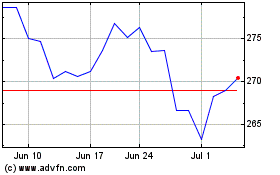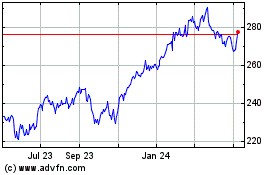Visa, MasterCard Class-Action Settlement With Retailers Rejected by U.S. Court -- 2nd Update
June 30 2016 - 12:46PM
Dow Jones News
By Austen Hufford
A U.S. Court of Appeals rejected the 2012 swipe-fee settlement,
originally valued at $7.25 billion, between the retail industry and
payments companies Visa Inc. and MasterCard Inc., calling the
agreement "unreasonable and inadequate."
"The benefits of litigation peace do not outweigh class members'
due process right to adequate representation," the Thursday ruling
said.
The court ruled that the settlement violated the rule that
requires the representative parties to "fairly and adequately
protect the interests of the class" and uncover any conflicts of
interest.
The 2012 settlement broke the class of plaintiffs into two
groups: one which accepted Visa or MasterCard from 2004 through
2012 and another which would accept the cards from 2012 onward. In
its ruling, the appeals court noted the conflict between the
merchants in the first class, which were pursuing solely monetary
relief, and the merchants in the second class, which were seeking
only injunctive relief.
"The former would want to maximize cash compensation for past
harm, and the latter would want to maximize restraints on network
rules to prevent harm in the future," the ruling said. In addition,
only the first group was eligible for the $7.25 billion cash
settlement and could opt out of the settlement.
Shares of MasterCard fell 1.9% to $90.36, while Visa shares
dropped 2.4% to $74.90.
The court said the class seeking injunctive relief "were
inadequately represented" because those merchants couldn't opt out
of the deal and they shared representation with the other class.
The court added that the only apparent benefits to putting the
competing claims into one class were higher fees for counsel and
the ability of the defendants to pay a bundled group with a single
payment.
The court noted the $544.8 million in fees granted to lawyers,
saying the firms stood to gain "enormously" if the deal was
completed.
"We expressly do not impugn the motives or acts of class
counsel," the court wrote. "Nonetheless, class counsel was charged
with an inequitable task."
According to the deal's critics, it also protected Visa and
MasterCard from future litigation. Wal-Mart Stores Inc. and Target
Corp. both opposed the deal.
A Visa representative declined to comment. MasterCard said it
was disappointed by the ruling and is reviewing the decision to
determine its next steps.
"We believe we presented a clear case to the court that the
settlement was fair and appropriate based on more than four years
of negotiation and the close involvement of the District Court,"
the company said in a statement.
"The settlement orchestrated by the card networks and banks
would have undermined merchants' legal rights," said Deborah White,
general counsel for the Retail Industry Leaders Association, which
opposed the settlement. "Today's decision is a victory for all
merchants and consumers."
In a class-action lawsuit, a large number of plaintiffs with
similar claims are able to sue a defendant, allowing for a bunch of
smaller-scale claims to get handled in the aggregate. A court
grants a "class" to a group that it determines meets the criteria;
in return, those within the defined class generally have to follow
the terms of any settlement reached.
Billed at the time as the largest settlement of an antitrust
class-action case in U.S. history, the deal -- reached in July 2012
-- was to end years of litigation brought by merchants against Visa
and MasterCard and several large banks that issue the companies'
credit cards, such as Bank of America Corp. and J.P. Morgan Chase
& Co.
Lawsuits filed by trade groups and several retailers in 2005
accused Visa and MasterCard of conspiring with banks to set
so-called swipe fees on credit-card transactions at arbitrarily
high levels. The fees, also called interchange fees, are set by
Visa and MasterCard and flow to banks that issue cards as revenue
each time a customer swipes a card at a merchant.
The settlement reignited a long-running battle over credit-card
transaction fees, with big-box merchants and retail trade groups
making their case for why the deal should be blocked.
"We conclude that the class plaintiffs were inadequately
represented," the court wrote.
Write to Austen Hufford at austen.hufford@wsj.com
(END) Dow Jones Newswires
June 30, 2016 12:31 ET (16:31 GMT)
Copyright (c) 2016 Dow Jones & Company, Inc.
Visa (NYSE:V)
Historical Stock Chart
From Mar 2024 to Apr 2024

Visa (NYSE:V)
Historical Stock Chart
From Apr 2023 to Apr 2024
